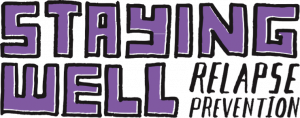
Psychoeducation
Psychoeducation is about providing service users and relatives or friends with information they need to understand and manage the difficulties they face. It should include information about:
- Diagnosis and management of psychosis or bipolar disorder
- Positive outcomes and recovery
- Types of support for carers
- Role of teams and services
- Getting help in a crisis
A key outcome is the development of a Relapse Prevention / Staying Well Plan developed through detailed analysis of previous episodes.

Key Steps
1. Identifying and managing common triggers
Triggers are situations which tend to occur prior to a relapse and are often linked to increases in stress levels e.g. taking on too much at work, or loss of an important relationship.
Where possible, strategies are identified to help avoid / manage triggers in the future e.g. work loading planning with a manager, or arranging to spend extra time with close friends / family following a bereavement / relationship breakup.
2. Spotting early warning signs are the very first changes that occur when a mood swing / psychotic episode is starting. If you can spot these, and do something to manage them early, this can prevent a full relapse.
Some early signs are more noticeable to the person experiencing them, particularly changes in feelings or thoughts. Some early signs, particularly changes in behaviour, can be picked up by relative/friends.
Common early signs of
- Mental health problems (general):
- Social withdrawal or isolation; not performing as well at school or work; low mood; anxiety; low motivation; poor sleep, decline in personal hygiene
- Psychosis
- Suspiciousness; odd beliefs or magical thinking; unusual perceptual experiences (e.g., sounds seeming louder than usual or colours brighter); confused speech e.g. trouble following conversation or going off on a tangent
- Depression:
- Low motivation; low energy; and feeling tired/listless
- (Hypo)mania:
- Feeling energetic/very active; being more talkative; and feeling emotionally high
3. Coping strategies are used to manage early signs and try to prevent relapse. The specific strategies that are likely to be useful will depend on the kinds of early signs identified.
Coping strategies for early signs of
- Mental health problems (general):
- Reducing stress levels where possible
- Good communication to convey support and explore what is happening
- Seeking help early where needed
- Depression:
- Having structure to the day
- Planning activities for each day that are enjoyable and give you something to focus on – including physical and social activity
- Having a good routine of sleeping, eating and exercise
- Challenging negative thinking
- Avoiding alcohol and drugs
- (Hypo)mania:
- Use calming activities
- Reduce or prioritise tasks
- Delay impulsive actions and avoid making big decisions
- Talk to trusted friends to get another perspective
4. Staying well strategies are things that we all do every day to maintain our wellbeing and regulate our mood. Understanding what makes us happy and what makes us sad is important in maintaining this balance.
Staying well strategies may include things like regular sleep and eating habits, spending time with people who make us feel good, and taking time on our own to relax and engage in personally meaningful activities.
How can I help with this?
Relapse Prevention / Staying Well Plans are often developed with support from a Care Coordinator or GP, either individually or with relatives/friends. Your knowledge of your relative is invaluable to this process. Ask your Care Coordinator or GP for more information on how to get this in your area.


